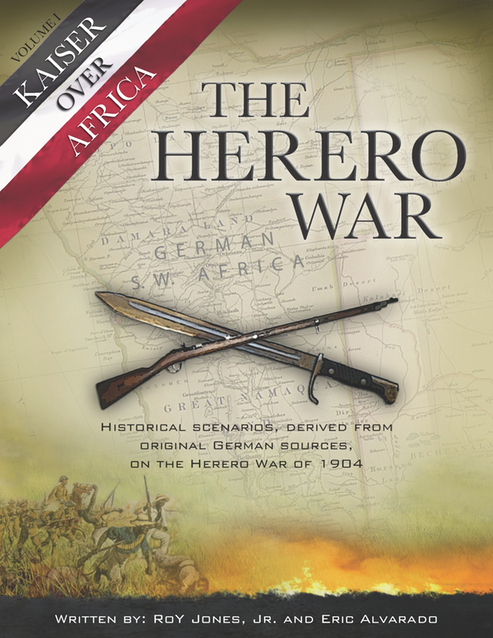The Herero War scenario and rules book by Roy Jones and Eric Alvarado is available for sale.

The book can be purchased online at:
Recreational Conflict (www.recreationalconflict.com)
(Recreational Conflict also carries Tiger Miniatures' German and Herero colonial figures).
On Military Matters (www.onmilitarymatters.com)
(On Military Matters carries a wide range of books on military history.)
The book is 184 pages long and is all-color, with 8 chapters of historically-deived rules and 13 historical scenarios. The scenarios and rules were derived from the original German sources: official histories, first-person accounts, and original maps. The rules and scenarios were then playtested over several years and dozens of games, to ensure play balance
A list of the scenarios can be found below in the SCENARIOS section. A list of the rules chapters can be found below under RULES & HISTORICAL OVERVIEW.
The Herero War
SCENARIOS
The book contains 13 historical scenarios, derived from original German sources, on the Herero War of 1904. This 7-month long war was fought in the colony of German South-West Africa (present-day Namibia).
Here's a list of the 13 scenarios, divided into four historically-based sections (or "mini-campaigns"):
I. THE HAMMER FALLS
(February 4-19, 1904)
The Struggle for Omaruru: Kompagnie Franke and 2nd Ersatz
Assault at Liewenberg: The South Height
Assault at Liewenberg: The Main Line
Ambush at Groß-Barmen
II. DESPERATE MOVES
(February 25-March 4, 1904)
Otjihinamaparero: The Threatened Flank
Klein-Barmen: Rosenberg’s Desperate Charge
III. THE HEREROS ASCENDANT
(March 13-April 13, 1904)
Owikokorero: The Ordeal of the Erkundungsabteilung
The Marines at Okaharui
The Trenches of Onganjira
Owiumbo: The Vengeance of the Hereros
IV. THE DIE IS CAST
(August 11, 1904 - The Day of Decision!)
Hamakari: The Long Day of Abteilung Mühlenfels
Otjiwarango: The Ordeal of Abteilung Heyde
Otjosongombe: Last Stand of the Hereros
RULES & HISTORICAL OVERVIEW
In addition to the scenarios, The Herero War book has historically-derived, thoroughly-playtested rules that reflect the unique characteristics of the combatants in this conflict.
There are rules on Herero concealment, spotting concealed Herero troops, and Herero deception & infiltration tactics. There are also rules that model the survivability and battlefield effects of the German command structure.
Historically, outstanding and inspirational Herero and German leaders influenced the melee capabilities of their troops. Thus all the Herero leadership rules and some of the German leadership rules are in the melee chapter.
Each rules chapter contains not only the rules but also historical information. Specifically, quotes from the German sources (including first-person accounts from battles) that show the historical basis for the rules, demonstrate the rules in action and give the reader a "you were there" snapshot view of the fighting.
Here is a list of the rules chapters:
I. SPOTTING & SUPPRESSION RULES
II. MOVEMENT
III. GERMAN LEADERSHIP
IV. GERMAN & HERERO MELEE RULES
V. ARTILLERY & MACHINE GUN RULES
VI. KIA & WOUNDED RULES
VII. FORCED PRONE BY SHOOTING
VIII. HERERO INFILTRATOR TACTICS
In addition to the rules, a historical overview section gives a "big picture" view of the Herero War - describing its origins and the main strategic and political events. There is also an annotated bibliography.
MORE ABOUT THE HERERO WAR
The Hereros were a group of sophisticated native fighters. The Hereros fought as riflemen in open-order, and were masters of ambush tactics and concealment - using smokeless powder to remain unseen. They would fight from the bush, or would build trench fortifications and hillside boulder fighting-positions. They were also brave and ferocious in hand-to-hand combat.
The Germans brought the iron discipline of the Kaiser's men and the killing power of the Mauser, the Maxim gun, and Krupp artillery to the continent of Africa. Against sophisticated foes like the Hereros, however, the Germans often faced stalemate or even defeat. Even the final German victory in three great battles on a single day - August 11, 1904, the "Day of Decision" - was hard-won.
The scenarios pit Herero riflemen, elite Herero "shock" troops, and Herero mounted forces against German Schutztruppe infantry, Marines, Sailors, Bastard and Witboi African allies, and the lead and steel of machine guns and cannon. The 13 scenarios trace the war from the initial battles of February, 1904, through the period of Herero ascendancy in March and April, to the "Day of Decision" in August.
The Hereros were fighting for their homeland and their freedom. The Germans were fighting for their Kaiser and for the glory of the German Empire. Pick your side, and refight The Herero War.